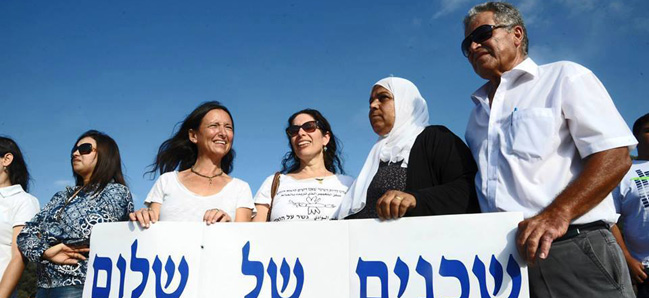
“We cannot afford the luxury and indulgence of despair. The situation is too desperate to be left to the despairing . . . We . . . insist upon hope.” –David Grossman
Everyone following the news in Israel knows what a difficult, challenging time this is on all levels: physically, emotionally, logistically, nationally, and morally. The death toll is mounting on both sides and the mood is grim, to say the least.
But David Grossman is right – there is no time for despair. That’s why SHATIL has been launching and supporting innovative initiatives to cool tensions, counter racism and intolerance, and promote a shared society. Since the onset of the conflict, SHATIL has been: Supporting local groups of Arabs and Jews throughout the country who are stubbornly insisting on neighborliness and connection in tough times; finding ways to protect the Bedouin population throughout the Negev; launching initiatives to support small, local businesses in the south; and helping social change organizations best serve Israel’s most disempowered.
As part of our efforts to ensure that marginalized communities have access to critical information, SHATIL helped Kol Zchut (All Rights) – a website providing online information on personal rights (such as labor issues, rights when drafted, benefits in cases of property damage, etc.) – translate its emergency section into Arabic and Amharic. In addition, we persuaded the Ministry of Justice to advertise its emergency hotline for reporting racist incidents in Arabic as well as Hebrew.
At the same time, through a new Facebook group, SHATIL is helping to connect consumers around the country with small, local businesses in the south that are suffering a critical blow from the ongoing rocket attacks. SHATIL is also organizing condolence calls to the family of Awda Alweij, a young Bedouin father killed last Saturday in a rocket attack in the Negev.
Many grassroots organizations also need assistance in dealing with these extraordinary challenging times. In response, SHATIL published and distributed a guide characterizing different responses to stress and is guiding organizations in effective ways of working with both individuals and the staff as a group.
And in response to violence at demonstrations – both by police and right-wing opposition, SHATIL is convening a round table meeting of 20 civil society organizations to coordinate and collaborate on actions regarding the government’s response to racism and incitement, and to review the role of the police in protecting freedom of assembly and in protecting demonstrators from violence.
